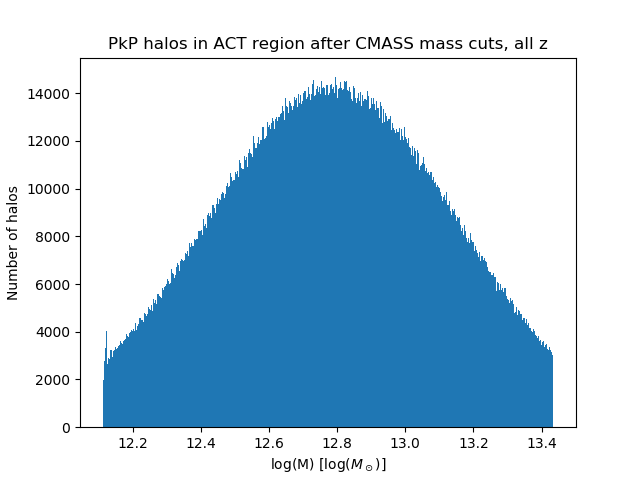Difference between revisions of "April 29, 2019"
| Line 16: | Line 16: | ||
== Peak Patch stacks == | == Peak Patch stacks == | ||
| − | For now, I only doing stacks for the following high redshifts, since the lower-redshift bins are much less populated in both CMASS and RedMapper. | + | For now, I'm only doing stacks for the following high redshifts, since the lower-redshift bins are much less populated in both CMASS and RedMapper. |
1632 to 1732 Mpc: z = 0.409 to 0.438, 1249 RM clusters, 2101 CMASS galaxies | 1632 to 1732 Mpc: z = 0.409 to 0.438, 1249 RM clusters, 2101 CMASS galaxies | ||
| Line 33: | Line 33: | ||
2332 to 2432 Mpc: z = 0.619 to 0.652, 1280 RM clusters, 6260 CMASS galaxies | 2332 to 2432 Mpc: z = 0.619 to 0.652, 1280 RM clusters, 6260 CMASS galaxies | ||
| + | |||
| + | For orientation, I'm making number density maps of the 'clusters' and 'galaxies' and smoothing them to 1 degree. On the next iteration I could change this; we could choose a certain physical size and have the smoothing angular scale vary with each redshift bin to match that physical size. | ||
Revision as of 04:02, 30 April 2019
Peak Patch Halo Selection
These are the steps that I use to select halos from the full-sky high-redshift Peak Patch lightcone run.
1) Project all the halos onto a Healpix map. Keep only the ones that fall in the same sky regions I defined for the DES clusters and CMASS galaxies. I keep a larger rectangle of galaxies than of clusters because I don't want clusters on the edge to have strange orientation effects.
2) From this reduced catalog take an approximately Gaussian distribution of masses centered on logM = 12.87 (where M is in M_sun) with a standard deviation of 0.37, which should match the CMASS sample. See figure below.
3) Divide these halos into bins of 100 Mpc. For each bin, take a random sample of n halos, where n is the number of CMASS galaxies in that region of redshift space.
4) For the clusters, take the sample left after step 1 and for every 100 Mpc bin, keep the top x halos. Here x is the number of DES Redmapper clusters in that region of redshift space.
Peak Patch stacks
For now, I'm only doing stacks for the following high redshifts, since the lower-redshift bins are much less populated in both CMASS and RedMapper.
1632 to 1732 Mpc: z = 0.409 to 0.438, 1249 RM clusters, 2101 CMASS galaxies
1732 to 1832 Mpc: z = 0.438 to 0.467, 1290 RM clusters, 6560 CMASS galaxies
1832 to 1932 Mpc: z = 0.467 to 0.496, 1493 RM clusters, 9847 CMASS galaxies
1932 to 2032 Mpc: z = 0.496 to 0.526, 1486 RM clusters, 11968 CMASS galaxies
2032 to 2132 Mpc: z = 0.526 to 0.556, 1661 RM clusters, 12011 CMASS galaxies
2132 to 2232 Mpc: z = 0.556 to 0.588, 2087 RM clusters, 11443 CMASS galaxies
2232 to 2332 Mpc: z = 0.588 to 0.619, 1917 RM clusters, 9439 CMASS galaxies
2332 to 2432 Mpc: z = 0.619 to 0.652, 1280 RM clusters, 6260 CMASS galaxies
For orientation, I'm making number density maps of the 'clusters' and 'galaxies' and smoothing them to 1 degree. On the next iteration I could change this; we could choose a certain physical size and have the smoothing angular scale vary with each redshift bin to match that physical size.
